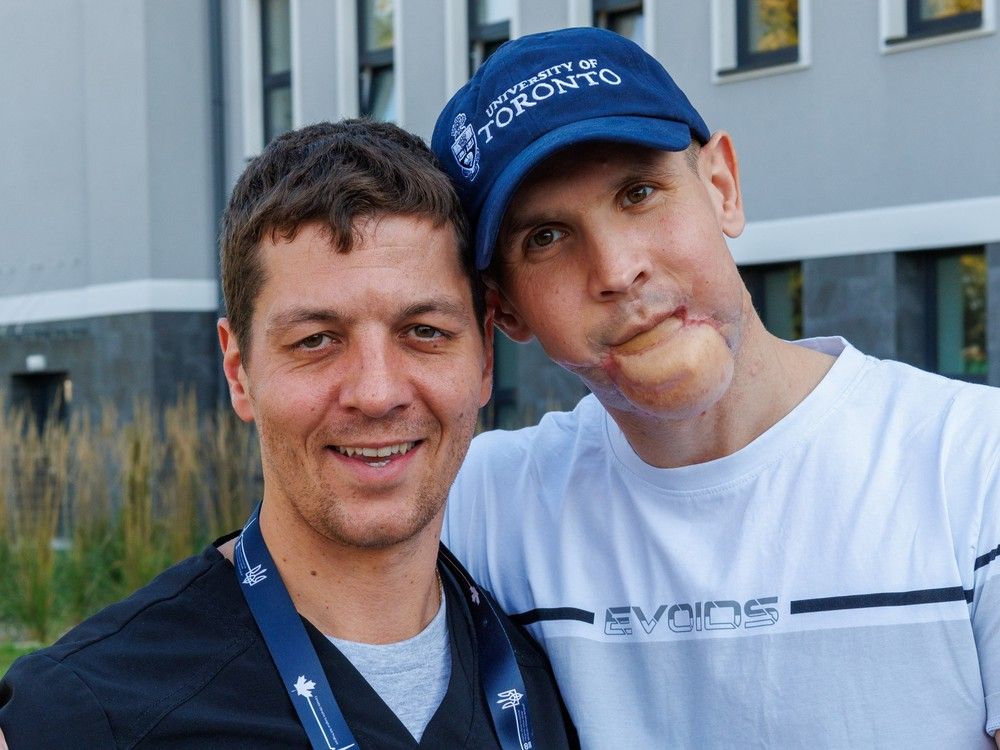“People were arriving in much graver condition than we had anticipated, with injuries that were previously unknown.”
Dr. Oleksa Rewa, a critical care surgeon at the University of Alberta Hospital, is pictured alongside a victim of the Ukraine conflict whom he operated on during a mission with the Canada-Ukraine Foundation, dedicated to providing life-altering plastic surgeries for war victims.
In his role as an Intensive Care Unit physician at the University of Alberta Hospital, Dr. Oleksa Rewa has encountered numerous individuals enduring severe injuries, a common occurrence in his line of work.
However, in March 2022, he embarked on a mission to Czeladz, Poland with the Canada-Ukraine Foundation, an experience that exposed him to trauma that will undoubtedly leave a lasting impact not only on his professional career but also on his personal life.
Describing the harrowing scenes he witnessed, Rewa reflected on the young men, aged between 18 and their 40s, who suffered from devastating injuries, some of the most severe one can survive.
“People were arriving in much graver condition than we had anticipated, with injuries that were previously unknown,” Rewa shared.
Rewa’s involvement in the Canada Ukraine Surgical Aid Program (CUSAP), a subsidiary of the Canada-Ukraine Foundation, entails traveling to Poland with a team of medical professionals from across Canada to perform intricate surgeries on Ukrainian military personnel and civilians severely injured in the Russia-Ukraine conflict.
Since their inaugural mission in 2014, the team has been conducting medical aid programs every two months following the outbreak of the war in 2022. It is estimated that there are approximately 20,000 amputees as a result of war-related injuries.
The patients, who have undergone life-saving surgeries, are often left with life-altering injuries, prompting the medical team to perform cosmetic and reconstructive procedures.
Specializing in head and neck surgeries, Rewa recounted the demanding nature of their work, with days lasting 16 to 18 hours, requiring unwavering focus and adaptability to address the challenging circumstances.
Despite facing unprecedented surgical challenges, Rewa found the experience profoundly impactful, transcending the routine nature of his usual surgical duties.
One particular patient, who had suffered severe facial injuries from a mine explosion, left a lasting impression on Rewa. The patient’s journey from a life-threatening injury to a series of reconstructive surgeries highlighted the resilience and hope embodied by these individuals.
Reflecting on the emotional toll of his humanitarian efforts, Rewa acknowledged how the experience had a profound effect on him, leading to a moment of introspection during a layover on his return journey.
The opportunity to engage in meaningful work outside his routine responsibilities not only alleviated the burnout he experienced during the COVID-19 pandemic but also reignited his passion for patient care.
With two missions completed and a third scheduled for April, Rewa’s commitment to this cause goes beyond humanitarian aid; it has become a personal and enduring passion, shaping his identity and professional outlook.
Looking ahead, Rewa envisions continuing his involvement in these missions for the foreseeable future, driven by the profound impact it has on both the individuals they serve and the broader context of the Ukraine war effort.
